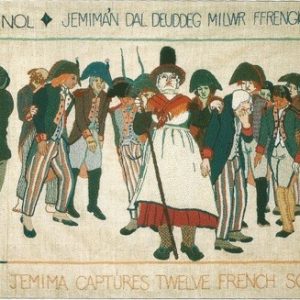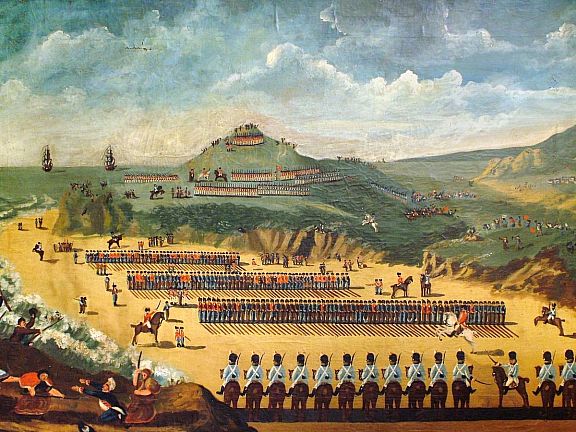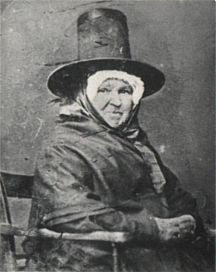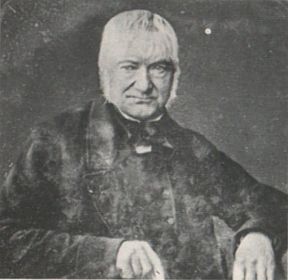I had a great aunt. She was the sort of great aunt that you would conjure up if you wanted to invent a great aunt. Always straight-faced, apparently straight-laced, and thoroughly wicked. I remember the exquisite agony of accompanying her, when I was a child, along the Crwys Road in Cardiff, pausing at every greengrocer (in the days when all their fruit and veg were on display outside), picking up an apple or some other fruit to inspect its quality, taking a bite, sniffing with disapproval, shaking her head and putting it back. By the time we got back to her house, she had consumed her full five a day without parting with a penny.
She was the source of all information on my mother’s side of the family, so naturally I assumed that everything she told us was bare-faced fabrication. Such as her mother, my great grandmother, having been married twice. Her first husband was supposedly a sea-captain who drowned. When I eventually started researching my family tree properly, I discovered my grandmother was illegitimate, born to a young woman living near Cardiff Docks, her occupation listed as laundress. Probably earning what she could at the docks too, so who knows, maybe my great grandfather really was a passing sea captain.
 |
| Great-grandmother, my nana and baby great-aunt |
I was surprised, when I explained this to various aunts and uncles, that they were shocked, determined to deny the story. Of course their mother was not illegitimate. Disgraceful! I was of a generation that found it interesting, whereas they were of a generation that found it shameful.
It turned out that illegitimacy in the more distant past was less shameful. Even though my great aunt talked about it with a hushed voice and much pinching of lips and meaningful nods, she clearly enjoyed telling me that our family came from St David’s and her swarthy colouring was down to the invasion of Fishguard in February 1797. Apparently the legendary Jemima Nicholas, whose red flannel Welsh costume and tall hat deceived the French into thinking she was the vanguard of the British army, arrived too late on the scene to stop a French soldier ravishing one local maiden.

I soon discovered that my family had no connection with St David’s or Fishguard, though they were from Pembrokeshire. My great-great-great-grandmother Hannah Skeel lived there, very proud of her connection with her brother, the Reverend Thomas Skeel, an Independent minister and founder of Zion Chapel in Spittal. Hannah married a stonemason, miles from Fishguard and had a daughter born shortly after the invasion – 16 months after, so my great aunt’s tale was a complete fabrication.
Well, not 100% fabrication. 98% maybe, but my research revealed an equally fascinating and disturbing story. The dreaded ‘Last invasion of mainland Britain’ was modelled more on a Carry On film than on D-Day. A small French troop, including many conscripted criminals, led by Irish-American William Tate, was sent to Wales to divert attention from the main French invasion of Ireland – which didn’t happen because of bad weather.

Tate’s men landed at a rocky headland, Carreg Gwastad, west of Fishguard, expecting the local poverty-stricken Welsh to rush to their side. The Welsh, being a cussed lot, picked up pitchforks and blunderbusses and skirmished with the French, a few on both sides being killed. Tate did manage to seize a couple of farms, although most of his convicts promptly deserted and ran amok in the surrounding countryside. There was indeed rape, but they were mostly looking for food. Within a couple of days, Lt Colonel Colby of the local militia and Lord Cawdor with the Pembroke Yeomanry Cavalry, had rounded up the French and obliged Tate to surrender.
What is most interesting to me is the reaction of Colby, Cawdor and the establishment in the aftermath. Many of the French prisoners, especially the officers were well-treated, dined in style and sometimes allowed to escape. But the invasion was an excuse for a clamp-down on the dangerous revolutionaries in the local Welsh population – the Nonconformists – Baptists, Methodists and others.
 |
| Zion's Hill Chapel, Spital. Several of my ancestors were buried there, including Hannah. |
Colby was obsessed with Anabaptists holding nocturnal meetings in the hills. “I long to get in among them.”
Winning the hearts and minds of the locals was not on the agenda. Crushing them into submission was. Several non-conformists were rounded up, accused of aiding the French, and two, Thomas John, a preacher from Little Newcastle, and Samuel Griffiths, a farmer from Poyntz Castle, were accused of High Treason, (when the potential penalty was still hanging, drawing and quartering). They were held for many months in far less agreeable conditions than the French prisoners, awaiting a farcical trial, which finally collapsed and they were released, close to ruin. Griffith's letter of complaint at his treatment is, unsurprisingly, one long scream of bitter resentment. The prosecutions scandalised the local Welsh.
 |
| allegedly Sarah Davies, nee Skeel, wife of Thomas Davies though I am not entirely convinced. |
Others, who were questioned as suspicious dissenters, were reluctantly allowed to go free after questioning. One was Thomas Davies, who gave a statement on oath before magistrates. He claimed he had “heard of the French landing about midnight, but he turned over and went to sleep again. The next morning early, two of his neighbours came along and took him to task for lying in bed with the French landed, so he got up and, after breakfast he went off to Hayscastle Smithy to shoe the mare. Then he set off for Pencaer with his brother-in-law Thomas Skeel. They got as far as Trefelgarn farm, just beyond St.Nicholas, when they met John Evans whose farm, Trefayog, had been taken possession of by the French, so all three of them set off for Trefayog to see what damage had been done. When they got there the French must have left, as they had some bread and cheese in peace and fed their horses. They thought better of seeking the enemy at closer quarters that day, and returned to their homes.”
Exciting? Well, it is to me because Davies’ brother-in-law was my Hannah’s brother Thomas Skeel. So although there was no French rape in my bloodline, I am descended from people nearly charged with High Treason because of their religion. Can you imagine a situation in which people could face hostility, abuse and persecution just because their religion was regarded with suspicion in a time of crisis! Couldn't possibly happen now.
 |
| The Rev. Thomas Skeel |
I suspect that Thomas Skeel, Thomas Davies, Thomas John and Samuel Griffiths all regarded themselves, in reality, as patriotic British subjects, loyal to their king, but I really wish that they had, instead, confronted Colby, Cawdor and the rest, and smacked them in the gob, as they deserved.

No comments:
Post a Comment
comments welcome